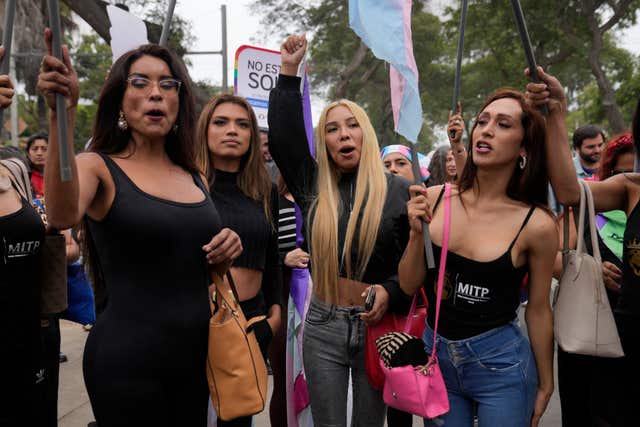
Protesters in Peru are demanding that the government repeals a decree characterising seven gender identities, including transgenderism, as “mental illnesses”.
Demonstrators gathered in front of the health ministry in Peru’s capital city, Lima, and the Peruvian Embassy in Ecuador’s capital, Quito.
The demonstrations coincided with the International Day Against Homophobia, celebrated since 2005 to mark May 17, 1990, when homosexuality – then considered a mental illness – was removed from the World Health Organisation’s International Classification of Diseases.
In Lima, hundreds protested against last week’s decree by Peruvian President Dina Boluarte’s administration. The Ministry of Health said the action would guarantee “comprehensive mental health care coverage” to those affiliated with public, private or mixed health plans.

Peru does not recognise same-sex marriage.
Demonstrators carried signs with a variety of messages including “My life is freedom, not a disorder”, “Health is not legislated in the past”, “The disease is you, transphobia kills” and “No diversity with Dina”.
Several people beat on drums and others chanted: “Trans people are love.”
“We have had conservative governments for many years. We had military governments, then right-wing governments linked to Catholic and evangelical churches, so the position regarding us they have revived again,” said Gia Cruzado, a transgender woman and writer.
“The decree is a step backwards and is a way to continue closing the doors to progress for our community,” Ms Cruzado said.

Gahela Cari, a transgender woman who unsuccessfully ran for congress in 2021, said that “being gay, lesbian, non-binary or bisexual is not a disease, it is a human condition”.
In Ecuador, dozens of members of a collective defending the rights of the LGBTQ+ community marched to Peru’s embassy. They staged a sit-in outside while waving flags and signs declaring that “being trans is not a disease”.


Why are you making commenting on The National only available to subscribers?
We know there are thousands of National readers who want to debate, argue and go back and forth in the comments section of our stories. We’ve got the most informed readers in Scotland, asking each other the big questions about the future of our country.
Unfortunately, though, these important debates are being spoiled by a vocal minority of trolls who aren’t really interested in the issues, try to derail the conversations, register under fake names, and post vile abuse.
So that’s why we’ve decided to make the ability to comment only available to our paying subscribers. That way, all the trolls who post abuse on our website will have to pay if they want to join the debate – and risk a permanent ban from the account that they subscribe with.
The conversation will go back to what it should be about – people who care passionately about the issues, but disagree constructively on what we should do about them. Let’s get that debate started!
Callum Baird, Editor of The National
Comments: Our rules
We want our comments to be a lively and valuable part of our community - a place where readers can debate and engage with the most important local issues. The ability to comment on our stories is a privilege, not a right, however, and that privilege may be withdrawn if it is abused or misused.
Please report any comments that break our rules.
Read the rules hereLast Updated:
Report this comment Cancel